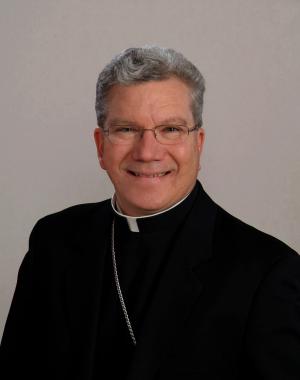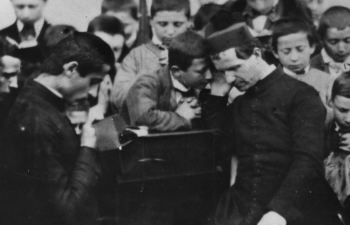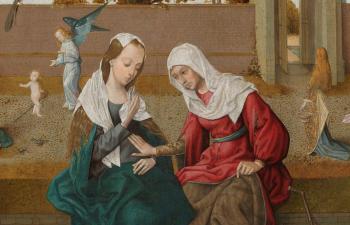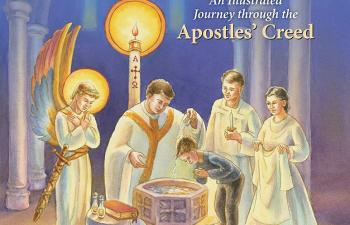Bishop Monforton reflects on the theme for Catechetical Sunday in the US: Teaching about God’s Forgiveness.
Therefore, if anyone is in Christ, he is a new creation; the old has passed away, behold, the new has come. All this is from God, who through Christ reconciled us to himself and gave us the ministry of reconciliation.
These words from St. Paul’s Second Letter to the Corinthians (5:17-18) illustrate the fact that Jesus is the one who forgives. While reconciling us to himself, Jesus has in turn provided us with the very ministry of reconciliation. In doing so, the Church becomes the ambassador for Christ in a world in such great need for forgiveness and unity. Through His Church, God appeals to the world; for the very purpose of the Incarnation and the Paschal Mystery is so that you and I may partake in the very holiness of God. The pastoral challenge before us is that we are all too familiar with the fact we are sinners in need of forgiveness—often, if I may add.
I was once asked by one of the youth in the Diocese of Steubenville if praying to God directly for forgiveness has the same result as “going to confession to a priest.” The short answer I gave was “no.” However, I went on to explain that each day, especially at the end of the day, we should examine our day and ask God for His forgiveness for those times when we were less than Christian in our words or actions.
I will give you the keys of the kingdom of heaven, and whatever you bind on earth shall be bound in heaven, and whatever you loose on earth shall be loosed in heaven.
Immediately after St. Peter acknowledged that Jesus is “the Christ, the Son of the living God,” Jesus gave St. Peter the authority to build up the Kingdom of God on earth, which includes the power to forgive sins. These words from Jesus in the Gospel of St. Matthew (16:19) indicate to us that Jesus has entrusted His Church with the ability to reconcile the human race to Jesus Christ. Just as Jesus healed and forgave sins in front of crowds of people, the priests of the Church possess the ability and charge to forgive sins. As I mentioned to the youth, in the Sacrament of Penance and Reconciliation the sins of the penitent are not simply removed, but also the void created is filled with God’s grace. Only a sacrament can do that.
And so, what then is a sacrament and why does the Church place such great emphasis on this particular sacrament? For one, according to the Catechism of the Catholic Church, sacraments are “God’s masterpieces” (cf. 1091). A sacrament is the very action of Jesus Christ in the life of an individual or in a community. In a sacrament, Jesus pours out the Holy Spirit on members of the Church in order that we may receive His grace. As we continue to read we learn that the purpose of the Sacrament of Penance and Reconciliation is our sanctification, in order that we may build up the Body of Christ among our brothers and sisters.
Not Passive Receptors
In the Sacrament of Penance and Reconciliation, we are not members of an audience or potted plants receiving our periodic fertilizer for continued growth. No, as we are nourished by God’s grace; we are further strengthened in the faith so that we may better express who we are as ones created in God’s image and likeness. Through this sacred gift, Jesus shows us that we are worthy to be forgiven.
There is a “smartphone app” for preparation for the sacrament, but the celebration does not occur by way of an app. There is no anonymity with God. While the priest may not be aware of the identity of the penitent “behind the screen,” God knows our very identity in the celebration within the seal of Confession. As with all sacraments, the Sacrament of Penance and Reconciliation is liturgical. In other words, the celebration gives glory to God. This is a time for praise, not despair. In the sacrament Jesus enables us to go forth and not just to sin no more, but also to demonstrate to others that the Paschal Mystery is meant for us, for our salvation. Jesus has made this personal for you and me.
Only God Forgives Sins
While we may possess the ability to forgive someone who has wronged us, only Jesus Christ can forgive sins. Jesus Christ explicitly states that only He has the authority to forgive sins and in turn to exercise Divine Power (Mk. 2:5-12). The good news is that Jesus has entrusted His Church with His divine authority to act in His name:
Jesus said to them again, “Peace be with you. As the Father has sent me, even so I send you. And when he had said this, he breathed on them, and said to them, ‘Receive the Holy Spirit. If you forgive the sins of any, they are forgiven; if you retain the sins of any, they are retained’” (Jn. 20:21-23).
This article was originally on page 17 of the printed edition.
This article is from The Sower and may be copied for catechetical purposes only. It may not be reprinted in another published work without the permission of Maryvale Institute. Contact [email protected]



















